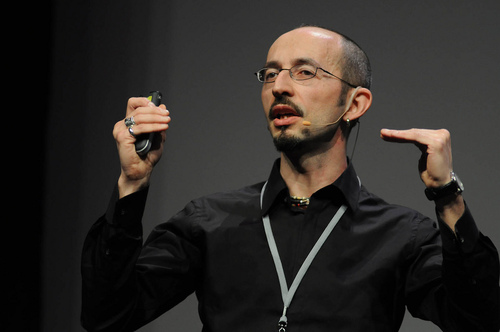Author: admin

'Place de la Toile' – Antonio Casilli interviewé sur France Culture
Ecoutez l’interview d’Antonio Casilli dans l’émission Place de la Toile (France Culture), produite par Xavier de la Porte. Dans cette « discussion d’étape » en vue de la sortie de Les liaisons numériques, l’auteur décrit son approche des technologies de l’information et de la communication.
« A partir de la micro-électronique de masse des années 1980, le phénomène numérique s’est transformé en une galaxie de pratiques quotidiennes, qui affectent nos représentations, nos structures sociales, mais aussi la manière de vivre notre propre corporéité.
Lift10 (Genève) : vidéo de la conférence d’Antonio Casilli sur les "natifs numériques"
Les conférences Lift sont des rencontres internationales qui réunissent les principaux acteurs et experts des médias numériques pour explorer la « façon dont les technologies du web changent le monde d’aujourd’hui et de demain ». Cette année, le sociologue Antonio Casilli a été l’invité de la dixième édition de Lift qui a eu lieu à Genève. Son intervention (en anglais), consacrée à une critique de la notion de « natifs numériques », est disponible ici en version vidéo.

What has country music ever done for urban sociology? (Sunday Sociological Song)
Ready for another installment of our cross-blog Sunday Sociological Song? This week, I was looking for a song illustrating Nels… read more What has country music ever done for urban sociology? (Sunday Sociological Song)
Who's fatter, the US or Europe?
What’s the explaining factor here: soul food? income level? music style? Jee, this sociology of obesity thing is more complicated than I thought…

Donald Duck, conflict simulations and the military-entertainment complex
Why invest in video games and 3D computer simulations when comics are still the cheapest and most effective tool for war propaganda?

This week in Anomie (Sunday Sociological Song)
How would you talk about sociologically-meaningful topics… in music? A Sunday Sociological Song to illustrate Durkheim’s notion of anomie.

Summer readings, cultural revolutions, destructive designs
My interest in the topic of the Chinese Cultural Revolution was jump-started by Tsinghua sociologist Guo Yuhua. In the summer… read more Summer readings, cultural revolutions, destructive designs

Antonio Casilli décortique trois "mythes d'Internet" (Sciences Humaines, n° 229 – août/septembre 2011)
“Qu’est le numérique, si ce n’est la poursuite de la vie par d’autres moyens ?” : c’est la question qui se pose sur le n. 229 du magazine Sciences Humaines le journaliste Xavier de la Vega, coordonnateur du très nourri dossier “Nos vies numériques”. L’article d’ouverture, signé par le sociologue Antonio Casilli, auteur de Les liaisons numériques. Vers une nouvelle sociabilité ? (Ed. du Seuil), s’attaque à trois mythes d’Internet : celui des effets désocialisants du Web, celui du “dualisme” virtuel/vie réelle et celui, omniprésent, des digital natives. Parmi les autres invités de marque de ce numéro spécial: Daniel Miller sur les défis des réseaux pour l’anthropologie, Fabien Granjon et Céline Bagault évaluent les effets révolutionnaires du Web, Martine Fournier se plonge dans le sexe en ligne, Maxime Coulombe et Justine Canonne abordent les jeux vidéo et les mondes immersifs, Henry Jenkins porte son regard sur fan et hackers et Jean-François Dortier conclut le dossier en nous conduisant au coeur de Wikipedia…
Running experiments on Twitter? Don't forget the bug
There’s nothing that error analysis wouldn’t fix. But I prefer to sit here and ponder the epistemological ramifications of the way bugs are impacting the traditional way we make science…

If you miss the sound of vuvuzelas, try listening to Die Antwoord!
2010 World Cup has been a mesmerizing spectacle, mainly because of the vuvuzelas. If you, like me, miss that disturbing, spitty, heartfelt, mongrel sound, here’s a – seemingly unrelated – piece of South African soundscape: Die Antwoord [NSFW].
